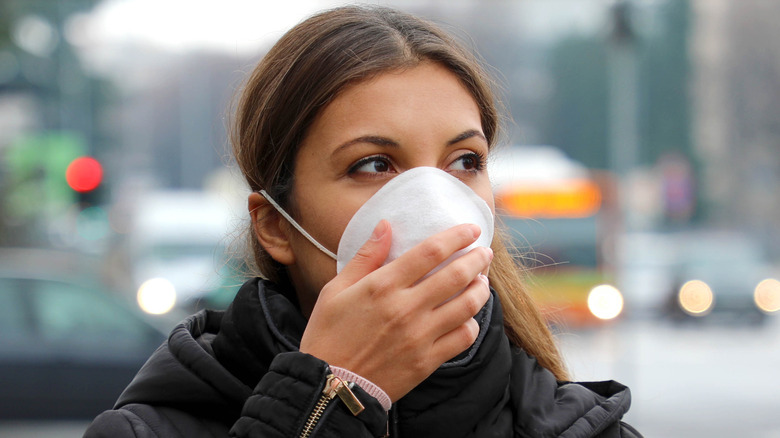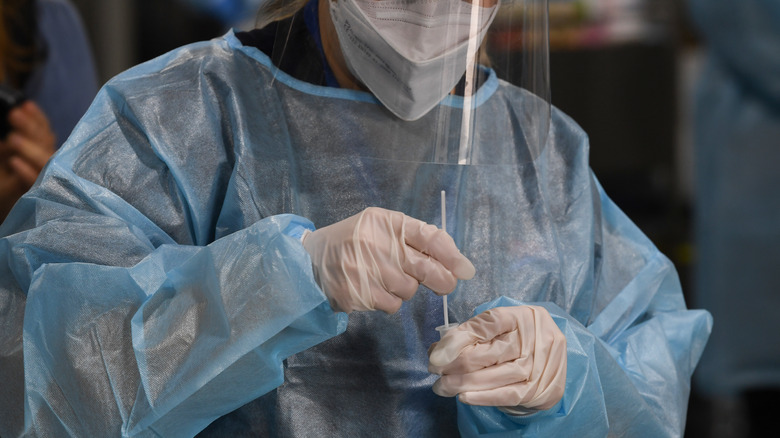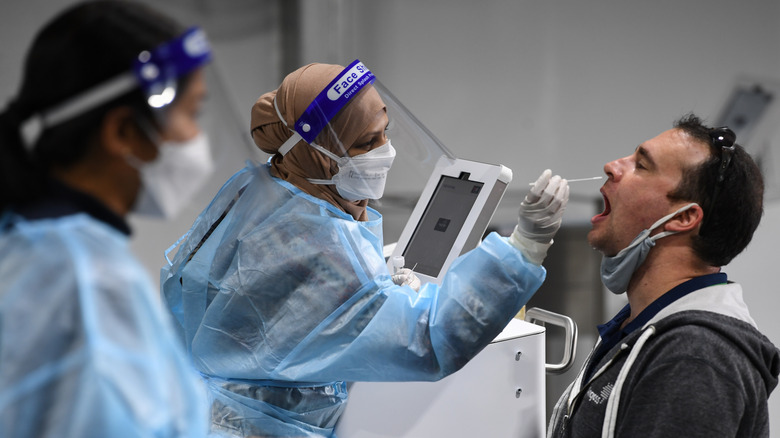What You Need To Know About The New COVID Mutation
Although they may neither behave nor seem like it, viruses need a host in order to survive so they aren't considered by science to be living things; they also change or mutate to adapt whenever they infect a body and when it replicates itself. So while mutations aren't necessarily a bad thing for the host, infectious disease expert Leyla Best of Unity Point Health points out that: "[what] matters is the impact the changes have on the virus itself. So, some viruses might have a few differences — a few mutations — but there are no noticeable changes to the virus. Sometimes viruses can have mutations that give the virus an advantage, whether that's a better attachment to cells or the ability to replicate faster. Mutations can also result in disadvantages for the virus, lowering the ability to attach to cells or taking longer to reproduce."
Such is the case with the Omicron variant, which presents the COVID-19 coronavirus' latest attempt to defy medical science's efforts to get it under control. Scientists who spotted the new variant describe it as having "dozens of mutations." And while they are calling on the public not to panic, scientists like Scripps Research Translational Institute director Eric Topol have also admitted that the Omicron is "the most concerning variant we've seen since [Delta] ... It's going to take a really high bar for something to take over for [Delta], and we don't know whether this is going to do it" (via The Washington Post).
Omicron first detected in South Africa
Omicron was first reported by doctors in South Africa, but no one knows where the variant actually came from. Scientists say Omicron is making them lose sleep because it has plenty of mutations, some of which have occurred in the spike protein, which essentially allows the coronavirus to develop new abilities. For context, the Delta variant, which is was responsible for the most recent coronavirus wave, had 16 mutations; Omicron has 32 (via iNews). There is a concern that these mutations could help the virus get past our immune defenses more easily and as a result, the vaccines which we rely on to get life back to normal are less effective.
While Omicron might have been designated a "virus of concern," South African doctors like Angelique Coetzee, who is chair of the South African Medical Association, says those who are suffering from Omicron don't seem have the same symptoms: patients did not report losing their sense of smell or taste and there was no drop in their oxygen levels. She tells Reuters that "Most of them are seeing very, very mild symptoms and none of them so far have admitted patients to surgeries. We have been able to treat these patients conservatively at home," and that the symptoms included fatigue for a day or two, headaches, body aches and pains.
But it's important to note that most of those who tested positive for Omicron were aged 40 or younger; and nearly half were unvaccinated, she said.
'Too soon to tell' what Omicron is really like: doctors
While it might sound like this new variant could be a more gentle version of its most deadly self, doctors right now say it is actually too early to tell whether the variant is going to turn out to be as problematic as Delta, particularly since it is currently the most infectious form of COVID that can be seen in South Africa's most populated area today (via BBC). Leading South African infectious disease physician Dr. Richard Lessells points out that: "We would of course expect the vast majority of those to be mild cases anyway, regardless of vaccination status [and that] There's even barely enough time for infections to have had time to progress to severe disease and hospitalization" (via The New York Times). In short, if Omicron causes severe COVID, we won't know about that for another week or two.
Still, governments aren't taking any chances and both the U.S. and E.U., as well as the U.K. have all imposed travel restrictions on travelers from seven African countries (via The New York Times). Medical companies are also trying to figure out how much of an impact Omicron will have on those who have been vaccinated, but it will take about two weeks to figure that out. For now, medical officials like Dr. Anthony Fauci are hoping people see this as a sign that it is either time to get vaccinated or time to get a booster shot (via ABC).


